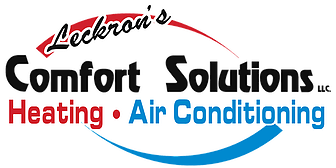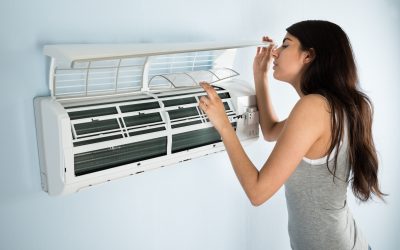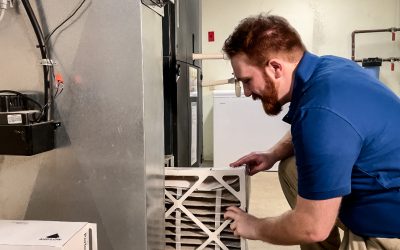The days of 30-degree weather are here with a promise for the next three months to bring a continuous temperature drop. If you haven’t given your HVAC system any thought, you may not be as prepared as you think.
A properly functioning HVAC system protects your family from the throes of a breakdown during winter. Nothing is pleasant about imagining your family shivering, huddled under a mound of blankets, waiting for an expensive emergency HVAC company to show up and save the day. Thankfully, there is a way to make this imagery stay carefully tucked away.
Scheduling routine and proactive maintenance means you are ahead of the game when it comes to system breakdowns and emergencies. While you cannot 100% prevent system emergencies, preventative maintenance catches the majority of issues. A few housekeeping winter items and teaming up with a professional ensures you cross your t’s and dot your i’s before a winter emergency.
Don’t let a rattle here or a clank there spell major trouble in freezing temperatures, not to mention overuse and a costly bill. Take steps to stay on top of your HVAC system this winter.
Schedule Professional HVAC Maintenance
Professional HVAC routine maintenance means a small upfront cost to extend the life of your unit. Long-term, you save money on repairs and a decreased monthly energy bill.
Your HVAC professional focuses on checking for leaks with refrigerant and carbon monoxide, inspecting condenser coils – cleaning and straightening them as needed, checking all gas and electrical connections, lubricating moving parts, testing your thermostat, and replacing the air filter. They will look for signs of duct leaks, issues with compressors or your motor, and cold rooms or spots that may be wasting energy.
Should they find anything that needs addressed now or in the near future, they will give you a heads up. At Leckron’s Comfort Solutions, our technicians know what the typical lifespan of most units looks like and when parts start to break down. They will advise you on how long you should have with your current unit, what problems they foresee coming up, how to prevent a breakdown or replacement, and the various options for handling them.
So, instead of being surprised with an expensive emergency, you can plan for repairs and replacements. Techs can advise you on when your unit will start using more energy due to failing parts or simply aging out. Sometimes, a new system will save you money in the long run, and a trusted HVAC company can help you determine your best options. Make no mistake – even the best systems waste energy if poorly maintained. Regular maintenance ensures it operates at its highest energy efficiency.
If you are concerned about your system’s warranty, many manufacturers require your system to be maintained regularly. Check with your technician on how to remain in compliance with your warranty program.
Check and Replace Air Filters
The role of an air filter cannot be understated. When your system’s air filter is clean, it allows the air to pass through the unit and into your rooms evenly, without overstrain. On the other hand, when your filters are dirty, the same air cannot flow freely through the system. It is stopped by the debris and irritants, dander, dirt, and dust stuck to your filter.
If the unit must push harder to get the air through the filter, you are more likely to experience breakdown or mechanical issues. Extend the life of your system simply by changing the air filter regularly. This is an easy task you can complete without the assistance of a technician. Most HVAC companies recommend replacing filters every three months, although the exact timespan depends on your household’s activities, pets, and pollutants.
Ensure the type of filter is appropriate for your system. Some units require a specific style, while others have more leeway. If you need clarification on which type of filter (link filter article) is best for your unit and lifestyle, chat with your technician during your maintenance visit.
Seal Ductwork and Insulate Pipes
Often tucked away in ceilings and in between walls, ducts function without notice. Yet, this highway for heat is quite crucial to ensuring your rooms stay toasty. According to the US Department of Energy, “Leaky ducts can reduce heating and cooling system efficiency by as much as 20 percent.” Imagine the savings on your monthly bill when your ducts deliver the total intended amount of heat.
When your HVAC system was installed, your ductwork was designed to deliver optimal heating. However, leaks in your ductwork can create opportunities for the warmed air to escape, resulting in cold rooms, higher bills, and an overworked system. To fight this, inspect exposed ductwork for gaps or separations.
Duct mastic is often the preferred method for sealing leaks. The material is gooey and does not harden, or in other words, won’t crack. It has a long lifespan and often lasts up to twenty years. However, if the gap is larger than ¼ an inch, it won’t work. In this case, you will need to use mastic, butyl, foil, or other heat-approved tape to seal the leak. When selecting your tape, look for the Underwriters Laboratories (UL) logo label.
Keep in mind that by insulating the ducts, you keep the heat in the pipes. While this is good for delivering heat to the home, it will not allow the heat to transfer into the basement. Pipes risk bursting if they get too cold. Consult with your HVAC company to discuss the best way to insulate your ducts.
Utilize Programmable Thermostats
Let’s face it – we are all busy. While the dark winter days may make us want to turn in early, life doesn’t stop because the sun got a few extra hours of shut-eye. Yet, with an old-school thermostat, the chances of your temperature being anything other than the same 68-72 degree setpoint is slim.
Programmable thermostats save wasted electricity (read: money). Depending on the thermostat you purchase, you can use a preset option or create your own. Smart thermostats monitor your family’s day-to-day activities and create a schedule around your comings and goings. While you are asleep or away at work, the thermostat lowers, allowing the home to remain cooler than usual. Before you wake up or arrive home, the setpoint changes, creating a comfortable environment for your family.
Thermostat vacation mode saves money. Instead of worrying about turning down the thermostat before leaving, you can focus on ensuring all your luggage is packed, your sunscreen is safe in a plastic bag, and you have all your children (let’s not pull a Kevin from Home Alone). Additionally, with smart thermostats, if you forget to set vacation mode, you can do this from the convenience of your cell while staring at the waves of a destination location.
With smart thermostats, you can monitor your energy usage regularly versus waiting on the bill. With this ability, you can adjust your thermostat as needed. Depending on the features of your smart thermostat, it may even be able to adjust to the weather and humidity levels, and geo-track your phone to adjust when it detects you are approaching your house.
Ensure Proper Ventilation
Your HVAC system recirculates the air found inside your home. As one can imagine, even with filtering, the air becomes a bit stale after a certain amount of time. It even can harbor bacteria, germs, viruses, and other illness-producing microorganisms. Ensuring proper ventilation is essential to maintaining indoor air quality and your family’s health.
So, why block off all the windows and doors if letting new air inside is good? Although it allows the introduction of clean air to a home, it comes at a high price. Your monthly energy bills will skyrocket, and your HVAC system must work harder to compensate for the additional strain of warming a continuous flow of freezing air.
Mechanical Ventilation
Today’s modern HVAC units utilize fans and air ducts to draw in outside air to your unit. This method is called mechanical ventilation because instead of manually adding fresh air by propping open a window, you’re mechanically adding it through your unit. Not only is your system adding a fresh, controlled source of air, but it also balances out humidity and moisture in your air. Be wary, though, if you pick the wrong type of ventilation for your home, your unit will work less efficiently and could cause mold issues. At Leckron’s Comfort Solutions, we will assess your home and help you pick the best system for the job.
Manual Ventilation
If you don’t have the option for mechanical ventilation, no worries – manual ventilation is still an option. Opening your windows on a winter’s day, while counterintuitive for heating your home, can quickly flush it of contaminated air – especially if you can open them and create a cross breeze to blow the air through. Combining this with a running fan pushes the air outside, cleaning it faster.
Flip on exhaust and kitchen fans to help draw air from the home to the outside. If a room does not have a fan, grab a box fan to help move the air from that room. Reducing clutter and excessive furniture and blankets will also help move the air through the space faster and reduce opportunities for mold and mildew.
Remember the Covid pandemic’s takeaway: indoor air filtering. Although your HVAC system contains filters, many homes add additional air filters to purify air before it makes its way to the HVAC system.
Utilize Zone Heating
The premise of using zone heating to warm your home is by zoning off your home, different zones are held at different temperatures. Zones can be set as a room or an entire area. Using a zoning system, heat warms areas where people spend time. For example, during the day, heat could be sent to the main floor of the house. At night, heat is redirected upstairs to the bedroom area.
If you are interested in zone heating, speak with your HVAC technician. This is not a DIY solution, especially given the cost range for setting up zone heating ($1500-$8500). Valves must be installed to allow heat to flow when certain zones reach a temperature setting. Thermostats must communicate in separate rooms to the unit, and it all must be wired to the furnace to work with the other rooms simultaneously.
At Leckron’s Comfort Solutions, we can walk you through the advantages of zone heating and if the installation makes sense for your living situation.
Energy-Efficient Upgrades
You don’t have to install an entire new ventilation system to have energy efficiency! There are numerous other options for savings.
Smart thermostats are an affordable choice, but the options don’t stop with those. If it is time to replace windows or doors, look for alternatives that prevent heat loss. Main area circular fans can be utilized to direct the air up or down, depending on the season or need. Water heaters have come a long way, with options qualifying for rebates and tax incentives. Weather stripping and insulation options are worth looking into. When deciding which option to use, check out the tax incentives for energy-efficient upgrades.
Emergency Preparedness
As much as investing in energy efficiency upgrades is a much-desired solution, you want your HVAC system to be ready to handle the winter as it is now, including the HVAC emergencies that could happen in the middle of a weather emergency.
- Change your filters
- Upgrade your thermostat
- Check your exterior vents
- Trim branches and near your outdoor unit
- Keep your home temperature comfortable in case of an outage
- Make sure doors and windows stay sealed
What to do if your heat goes out
Unfortunately, HVAC systems can break down at the worst possible moment. In the middle of severe weather, HVAC techs may be backed up with a waitlist of other emergencies, so it is good to know some tricks to keep warm if the heat goes out. You want to concentrate on keeping warm, heating the house with other measures, and spreading out the available heat as little as possible.
- Run space heaters and use fireplaces
- Light candles
- Use rugs
- Cook and boil water
- Block cold air – draw your curtains
- Center into one room
- Layer clothing and blankets
- Use heating pads and blankets
- Do laundry
- Stay active
- Eat and drink warm items
- Let your faucets drip; open cabinets; place space heaters near pipes
Prepare to Cool Down
With the temperatures continuing to drop, now is the time to keep your winter HVAC tips at the forefront of your mind.
“Called them for a quote; they came out in a timely manner. The owner walked with me and we figured out how to run a central heat and air system in my new house(others did not take the time). They had the price by the end of the day. They came and installed everything in a timely manner and were very professional the whole time. I would recommend them to anyone wanting a professional job done. Great job!!”, – Javan M., customer
Evaluating your home, scheduling a maintenance checkup, and preparing for the unexpected leave your family in the best position heading into Pennsylvania’s unpredictable winter weather.
At Leckron’s, we aim to make your HVAC system one less worry this winter. Call us to schedule your winter maintenance checkup so you only have to do is find your snow shovel in time to plow your driveway before work.




